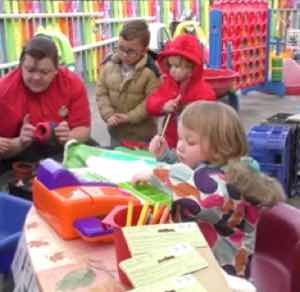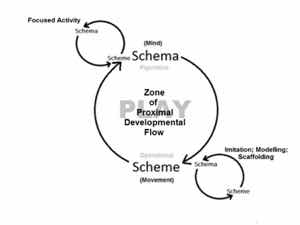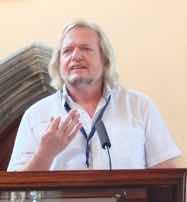Guest post
Education for Sustainable Citizenship in Early Childhood
Dr John Siraj-Blatchford is a well-known name in Early Childhood research and a staunch advocate for improving the outcomes for young children. I have read a lot of his writing, but one article caught my eye when preparing the Early Years Summit – Wellbeing and Sustainable Development. Co-authored with Lynette Brock – a passionate supporter of play for children – the article explores how sustainability and integrated cross-generational initiatives are essential to improving children’s wellbeing and welfare.
This was a fresh perspective on children’s wellbeing that I’d not come across before, but which made a lot of sense. So I was delighted when Dr Siraj-Blatchford and Lynette Brock submitted the guest blog post below, linked to this very subject!
At the end of the blog post, you will find a link to the original article, along with links to other, free articles, and details of training sessions and conferences.
Education for Sustainable Citizenship in Early Childhood
by Dr John Siraj-Blatchford and Lynnette Brock.
Education for Sustainable Development is about Environmental Education, it is about Global and Intercultural education, and it is about the Economics of wellbeing and the virtue of thrift. Most important of all, Education for Sustainable Development is also about improving the learning outcomes of children who are currently underachieving. Inequality and underachievement provide a significant barrier to sustainable development and this has been identified as a major priority in the United Nations Sustainable Development Goals. References are provided at the end of this posting to free to download resources that provide more detailed explanations and rationale.
Education for Sustainable Citizenship in Early Childhood (ESCEC) draws upon the logic of the Convention on the Rights of the Child which requires us to consult the child on all matters that affect them. In fact their future is the central concern of Sustainable Development, and we therefore believe they should be given a voice in determining this future. From the ESCEC perspective it is important for children to learn about the interdependency of humanity and nature, and about their interdependency with other people near and far. But it isn’t enough just to learn about the efforts being made in achieving a more peaceful and sustainable world, in adopting a ‘rights’ perspective it is clear that children also need to be involved in contributing to these efforts.
 SchemaPlay is currently engaged in a very successful and ongoing 6 month collaboration with Kent County Council Early Years and Child Care Service in promoting Education for Sustainable Citizenship in Early Childhood Education (ESCEC) across the local authority.
SchemaPlay is currently engaged in a very successful and ongoing 6 month collaboration with Kent County Council Early Years and Child Care Service in promoting Education for Sustainable Citizenship in Early Childhood Education (ESCEC) across the local authority.
A ‘Nursery in a Nursery’ at Little Learners Preschool Kent
 The SchemaPlay model provides a major extension and continuation of work first published by Chris Athey in 1992. The model has also been built upon the pedagogic insights of Vygotsky’s ‘Zone of Proximal Development’ (ZPD), Csikszentmihalyi’s (1979) concept of ‘Flow’, and the distinction Piaget (1969) made in his later work between cognitive schemes and schema. Recent evidence related to the existence of ‘mirror neurons’ and breakthroughs in our understanding of ‘embodied cognition’ have provided further justification for our adoption of this approach.
The SchemaPlay model provides a major extension and continuation of work first published by Chris Athey in 1992. The model has also been built upon the pedagogic insights of Vygotsky’s ‘Zone of Proximal Development’ (ZPD), Csikszentmihalyi’s (1979) concept of ‘Flow’, and the distinction Piaget (1969) made in his later work between cognitive schemes and schema. Recent evidence related to the existence of ‘mirror neurons’ and breakthroughs in our understanding of ‘embodied cognition’ have provided further justification for our adoption of this approach.
We are currently providing one day courses that include presentations, practical activities and open discussion. Participants will be shown how our model has been developed to support early years’ educators understanding of their role in providing emotional scaffolding, and in ’seeding’ children’s learning in free-flow play. Our next training opportunity is offered in London and focuses specifically on Education for Sustainable Citizenship:
13th April 2017: Quality education for Sustainable Citizenship in Early Childhood, Friends House, 173-7 Euston Road, London NW1 2BJ
See us also at the ENABLE Conference: 8th March 2017 presenting: Taking Play seriously: Examining how play works and how best to support it, ENABLE Conference, London
Bookings for training sessions can be made through the links provided on: http://www.schemaplay.com/Schedule.html
Or by email to: lynnette@schemaplay.com
Further reading available free for download:
Siraj-Blatchford, J., and Brock, L. (2016) Wellbeing and Sustainable Development: The legacy of Maria Montessori, paper presented at the European Early Childhood Education Research (EECERA) Conference, Dublin, September, Download from http://schemaplay.com/Docs/Wellbeing_SD.pdf
Siraj-Blatchford, J. & Brock, L. (2015 ) Taking play more seriously: A Montessori approach to understanding Free Flow Play , TACTYC Research Briefing Download from: http://schemaplay.com/Docs/Research%20Brief%20Final%20P.pdf
Siraj-Blatchford, J., Smith, K., and Pramling Samuelson, I. (2010) Education for Sustainable Development in the Early Years, Gothenburg, Organisation Mondiale Pour l´Education Prescolaire (OMEP) Download from: http://www.327matters.org/Docs/ESD%20Book%20Master.pdf
See also:
Siraj-Blatchford, J., Park, E., and Mogharreban, C. (EDs) (2016) International Research on Education for Sustainable Development in Early Childhood, Springer Books
Siraj-Blatchford, J. and Huggins, V. (2015) ESD Special Edition of Early Education, the Journal of the British Association of early Childhood Education (BAECE) https://www.early-education.org.uk/early-education-journal
 Dr John Siraj-Blatchford is an Honorary Professor at the University of Plymouth, and works as an independent educational researcher, trainer and consultant. He was previously employed at the University of Cambridge Faculty of Education and served as an Associate Director of the ESRC Teaching and Learning Research Programme. He was recently commissioned by UNESCO to provide an ECCE review of the UNESCO Decade for Education for Sustainable Development and he chaired the ECCE for Sustainable Development workshop at the 2014 UNESCO ‘End of Decade’ Conference in Nagoya, Japan.
Dr John Siraj-Blatchford is an Honorary Professor at the University of Plymouth, and works as an independent educational researcher, trainer and consultant. He was previously employed at the University of Cambridge Faculty of Education and served as an Associate Director of the ESRC Teaching and Learning Research Programme. He was recently commissioned by UNESCO to provide an ECCE review of the UNESCO Decade for Education for Sustainable Development and he chaired the ECCE for Sustainable Development workshop at the 2014 UNESCO ‘End of Decade’ Conference in Nagoya, Japan.
 Lynnette Brock is an inspirational trainer with a wealth of experience gained from working with young children in a range of early years’ settings where she held a variety of posts including practitioner, SENCO, head teacher and group training consultant. Prior to SchemaPlay, Lynnette delivered the Early Childhood Studies degree, and is a Montessori teacher trainer. Lynnette is also an avid supporter of play in both the indoor and outdoor environment; in particular the role of play in contributing to children’s self-esteem, motivation, learning and knowledge. She is passionate about supporting early years’ educators in ‘seeding’ the play environment to effectively balance play and teaching
Lynnette Brock is an inspirational trainer with a wealth of experience gained from working with young children in a range of early years’ settings where she held a variety of posts including practitioner, SENCO, head teacher and group training consultant. Prior to SchemaPlay, Lynnette delivered the Early Childhood Studies degree, and is a Montessori teacher trainer. Lynnette is also an avid supporter of play in both the indoor and outdoor environment; in particular the role of play in contributing to children’s self-esteem, motivation, learning and knowledge. She is passionate about supporting early years’ educators in ‘seeding’ the play environment to effectively balance play and teaching
Kathy Brodie
https://www.kathybrodie.com/author/kathy-brodie/Kathy Brodie is an author, Early Years Professional and Trainer specialising in online training and courses. She is the founder and host of the Early Years Summit and Early Years TV, weekly Professional Development for Early Years practitioners and educators.

AUTHOR Asasa Academy
Posted on 12:58 pm August 14, 2018.
Thank you for the post Kathy. Dr John is a great personality. Nice to see information about his theories about kids and their education.